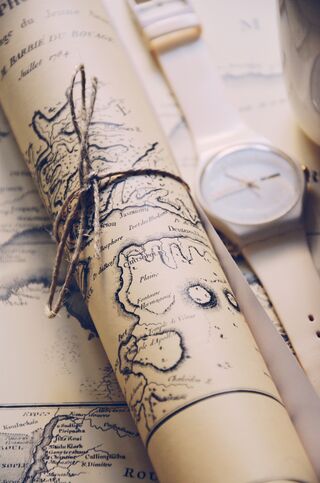Happiness
Questing: The Happiness of Pursuit
People who thrive in life tend to score high in novelty-seeking behavior.
Posted June 1, 2022 Reviewed by Davia Sills
Key points
- A hunger for novelty is at the heart of the exploratory urge and often our own restlessness.
- We don’t just crave security and certainty, but their opposite—passion, spontaneity, novelty, discovery.
- The call of the road doesn’t go away. If it isn’t answered or even acknowledged, it can shape-shift into disquietude or outburst.

When he was in his 20s, travel writer Bruce Chatwin was an art expert at Sotheby’s, a job he found increasingly distasteful. One morning, he woke up blind. The doctor said there was nothing organically wrong with him. “You’ve been looking too closely at pictures,” he said. “Why don’t you swap them for some long horizons.”
So he went to Africa. His eyes recovered by the time he got to the airport.
The philosopher Blaise Pascal once said that all our miseries derive from not being able to sit quietly in a room alone, but surely some of our miseries derive from too much time sitting alone in a room, legs pulsating under the desk, running in place.
Our orbits can so easily narrow down to the use of a few beaten paths, a handful of faculties, the company of the same people and the same ideas, the cadaverous light of the computer and television, a small wedge of experience that excludes whole universes of pleasure and whole continents of people, while the larger life that’s always out there accuses us of mere contentment.
But there’s a part of each of us that inevitably grows weary of the status quo, hungry for a challenge or new horizon, which feels born to run—to move, explore, experiment, travel, climb, create, investigate, invent, pioneer, and discover. To grow. The world, and our own individual lives, owes its progress and passion to the spirit of questing—even restlessness—within us.
In her book New: Understanding Our Need for Novelty and Change, Winifred Gallagher refers to “neophilia”—the enthusiasm for novelty that’s at the heart of the exploratory urge—as the quintessential human survival skill, whether we’re adapting to climate change on the primordial African savanna or coping with the computerization of modern life and what she calls our desk-tethered world; whether we’re exploring uncharted terrain, investigating new artistic techniques, poking around at the further reaches of a scientific theory, or probing the endless possibilities of intimacy.
Some of us are neophiliacs; some are neophobes—people who shy away from novelty, if not outright fear it—and most of us fall on the broad spectrum between. But neophilia’s grand design is to help us learn and create, as well as to adapt to the moving target that is the world, both then and now. “It’s all about anticipation, desire, wanting.”
Researchers looking for the traits that characterize those people who tend to flourish in life have found that such people tend to score high in novelty-seeking behavior. Ironically, they also score high on persistence, which might seem incompatible but isn’t. Gallagher considers the two an ideal combination. “Don’t go wide and shallow,” she says. “Use your neophilia to go deep into subjects that are important to you.”
The most common accusation leveled against the restless, of course, is whether their novelty-seeking is done for the sake of encounter or escape, whether they’re moving toward something—freedom, adventure, aliveness, the horizon—or away from something. The insinuation is that there’s something they don’t want to face or don’t want to feel. And sometimes, it’s true.
Sometimes restlessness is avoidance, a kind of motion sickness in which you use activities like travel, job-hopping, relocation, promiscuity, and upward mobility as distractions from deeper explorations and commitments—the emotional equivalent of channel surfing.
Emerson once said of travel, “At home I dream that at Naples, at Rome, I can be intoxicated with beauty and lose my sadness. I pack my trunk, embrace my friends, embark on the sea, and at last wake up in Naples, and there beside me is the stern Fact, the sad self, unrelenting, identical, that I fled from. My giant goes with me wherever I go.”
In other words, you can go from port to port, job to job, and affair to affair, always trying to chase down paradise, a dream job, a soulmate, or a grand unified theory, but you’re still going to see the same inner sky no matter what new worlds you discover.
A revolt against the fixed
The restlessness that’s at the heart of questing and novelty-seeking can encompass anything from garden-variety hyperactivity to the kind of headlong busyness that characterizes such a large swath of human activity. It can look like travel fever, the passionate intensity typical of creative and exploratory types who are seldom satisfied with the status quo, the feeling of being unsettled within yourself, or an ever-present hunger for personal growth and spiritual refinement.
But we come by it honestly. We all come from nomadic stock. Mobility is the rule in human history, sedentary life the exception. And we still carry the residue of that nomadic heritage. We have genes selected for curiosity and novelty, limbs made for walking, long childhoods during which to practice exploration, and brains designed to think imaginatively.
In the brainstem of every human being is a revolt against what’s fixed, and deep migratory and exploratory urges. Ten thousand years of settlement isn’t enough to undo the several million years that forged our hunter-gatherer genome.
Plus, there are plenty of cultural forces that incite our hunger for novelty: a foundational (and spreading) Western myth which says that expansion is inevitable and preferable and that the way to a better life is to keep moving; a baffling multitude of outlets for our restlessness; endless options and replaceable parts; a global marketplace supersaturated with goods and improvement plans; and the freedom and leisure and, for a lot of us, the money to make good on them. And it can make us flighty.
The hunger for novelty is also self-propelling. The drive for discovery leads to pleasure—the satisfaction of the urge to explore, the scratching of an ancient itch—and, in turn, that pleasure spurs more discovery.
And more so in some people than others. Some of us come in with an extra dose of wandering in our genes, compliments of a chromosomal variant linked to both ADHD and thrill-seeking, and folks with migratory ancestors. And the original mutation that created this gene dates to about 40,000 years ago, a period characterized by major human migrations and explorations of the planet.
But it’s not just a human trait. Restlessness is as old as the world. The lime in our bones and the salt in our blood are inheritances from what poets call the restless sea, and there’s marine limestone at the top of Mount Everest.
Settling for less
For better and for worse, the call of the road doesn’t go away, and if it isn’t answered or even acknowledged, if it isn’t given some rein, it can shape-shift into disquietude, busy-mind, and outburst. In the movie The Great New Wonderful, a couple live in a mind-numbingly stale routine together in a highrise apartment outside of New York City. Every evening, while he watches TV, she sits at the kitchen table and creates elaborate collages of all the places she yearns to travel to and then puts the finished collage in a hall closet along with what appear to be dozens more of them, all stacked up, 40 years’ worth.
One day, while he’s out smoking his after-dinner cigarette on the patio, she snaps. Bursting out the balcony door, she charges at him and tries to push him over the railing.
Culture is what comes between an animal and its environment; sometimes it’s a buffer, sometimes a barrier. Often a barrier. The transition to sedentary life and a fixed address had and has a calcifying effect on the kind of kaleidoscopic, surround-sound worldview that characterizes the wild kingdoms and the lives of hunters and children, which may be some of what we’re after with our questing. We literally settle for less.
The sedentary life is also bad for our health, contributing to a host of maladies—cardiovascular disease, diabetes, osteoporosis, stroke, hypertension, depression, obesity—that together account for up to 75 percent of the deaths in industrialized countries.
The urge to journey and explore works against the urge to stay put and sink roots. Granted, we like the comforts of home, the conveniences of technology, the recognition of the local shopkeepers so we don’t have to continually show them our driver’s licenses. But we don’t just crave security and certainty. We also crave their opposite—passion, spontaneity, novelty, discovery, an adrenaline rush—aliveness.
Which is why it pays to bundle some novelty into your days because novelty is a corrective for habit and routine and everyday trances. Get up on the other side of the bed for a change, sit at a different side of the breakfast table, drive to work by a slightly different route than normal, order something other than your usual at the restaurant, rearrange one piece of furniture in your house.
Restlessness and boredom are types of hunger, signals that we’re starved for stimulation and engagement, for novelty, for meaning. And if we don’t use them as tonics to catalyze our quests and creativities, they can easily become narcotics that paralyze us and block our forward momentum.
Some years ago, I began experiencing Restless Legs Syndrome during sleep, which apparently 5-10 percent of the population may suffer from (that’s potentially 400-800 million people). There are prescription meds for Restless Legs Syndrome, but early on, I made a key observation: I could get immediate relief from the symptoms of it (creepy-crawly sensations in the lower legs) by simply getting up and moving. If I paced around the house for 5 minutes, I could typically get right back to sleep.
What this told me was that the medicine I needed had something to do with movement. As in rest-less. So if you suffer from restlessness, a useful question to ask yourself might be, “What wants to move, and where does it want to go?”




